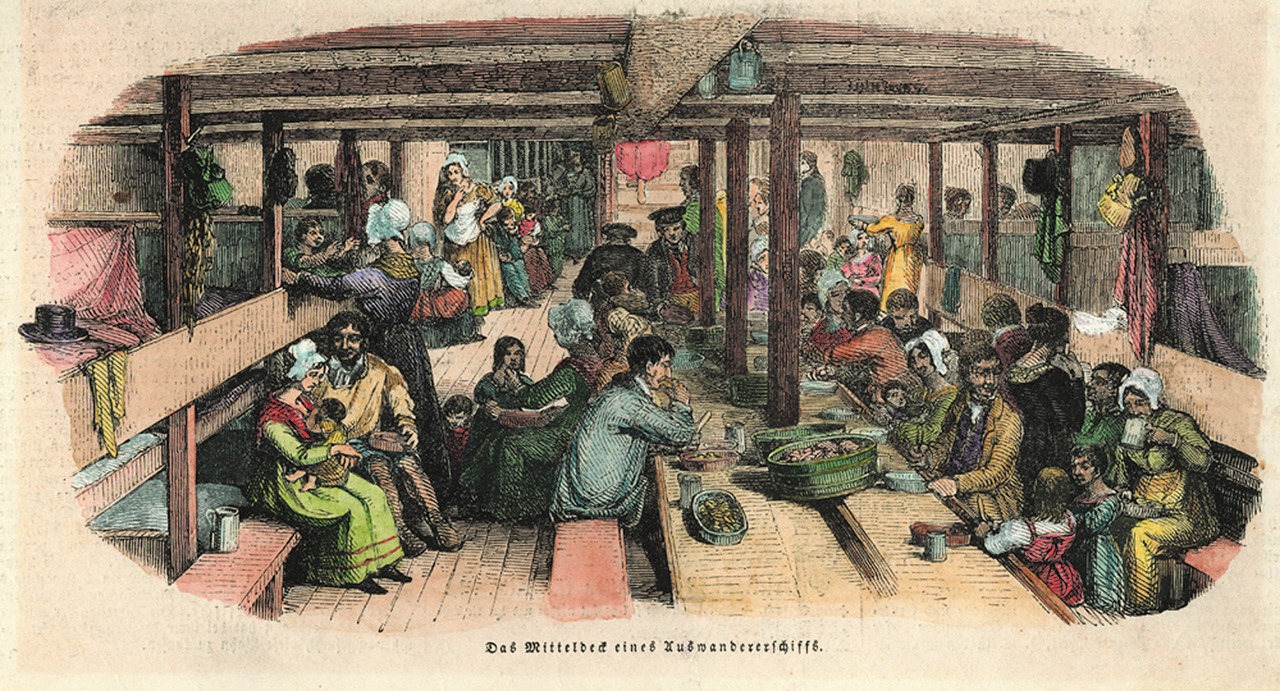Letter from Heinrich Demler to his Parents in Lauffen am Neckar (1835)
Abstract
In this letter from 1835, emigrant Heinrich Demler tells his parents in Lauffen am Neckar about his journey from Le Havre to New York, the first stage of his emigration experience.
Source
Washington, Jan. 9, 1835
Dear parents and siblings,
[…]
God willing, my letter will find all of you well. Our strength and health have not suffered from the harrowing voyage.
[…]
Fifty ships arrived with the first good wind. We paid 55 francs for the voyage and 36 for our board.
We set sail with the most favorable winds on May 25th on a large American three-master, the Manchester, under Captain Swift. The crew consisted of 2 officers, 18 sailors and 3 Negroes. The passengers numbered 18 in the cabins (each of whom had paid 500 francs), and 230, mostly Rhinelanders, on our deck. The wind was extraordinarily strong. Within three hours we had lost sight of the land altogether. Knorpp and I, with a few young men, helped the sailors to spread and rig the sails. But soon we found ourselves incapable of doing so, for we felt such dizziness and discomfort that we were stumbling about like fools. We went down to the deck. There is no more horrid sight than beings who are supposed to have an immortal soul packed together and cheated in every possible way; all of this is worse than the slave trade. The bunks were arranged on either side of the deck, stacked in twos, most of them so low that one could not sit upright. There were 4, 5 or 6 to a bed, the chests and food piled up in the middle. Nobody had warned us, and no one was prepared for the storm on the first day. My things were firmly tied down, but other peoples’ trunks had toppled over each other, everything topsy-turvy. The poor folks were stuck in the dark hole and suffered the worst seasickness, a total loss of memory, dizziness, vomiting, ten times in one hour.
When we cleaned up, we found 5 broken bottles of brandy in our chest. Only 7 remained […]
I spoke French and German, the doctor French and English. For that reason, we were forever playing the interpreter. The captain and sailors spoke only English. We had to cook for ourselves, and every day there were arguments in the kitchen among the women, who had gradually recovered. The voyage proceeded quite well, by the way. The weather changed frequently. Storm, rain and fog alternated with calm and fine weather. At the beginning, we never saw the sun for 11 days in a row. We weathered 7 storms. The fiercest was in the night following an evening on which the sea had been splendidly illuminated, as if all the stars had settled upon its surface. Our captain spoke with the captains of the five other ships we eventually encountered. Swallows, ducks, and wild petrels followed us the entire voyage. Whole schools of fish, big as hogs, surrounded us in fine weather. We saw whales in the distance. It was always very cold, and our leaders feared we might hit an iceberg. We finally sighted land on the 1st of July at 6 in the morning. In the evening we were already anchored three miles from New York. The doctor found us all in excellent condition. Four children had been born at sea and were brought on land in good health. We disembarked on the 3rd of July. Oh, what a joyous moment to step onto green land again after so many gloomy hours. We had spent enough sleepless nights, we crew of young, hardy men, often drenched to the skin.
New York is the largest and most bustling city in North America. Nearly all the French ships sail there, and I advise all of my countrymen to travel not to Holland or Bremen, but rather to [Le] Havre de Grace, which is more convenient and cheaper for them, although they must be very wary of the roguish agents.
[…]
With greetings to my parents, siblings and friends, and in hopes of a quick reply, I remain your sincere friend and son Heinrich Demler, tinsmith
Source: Letter from the emigrant Heinrich Demler to his parents in Lauffen am Neckar in 1835 –Account of the voyage from Le Havre to New York. Stadtarchiv Heilbronn E001-83, p. 1. Available online at: https://stadtarchiv.heilbronn.de/stadtgeschichte/unterrichtsmaterial/neuzeit/auswanderung/quelle-brief.html
